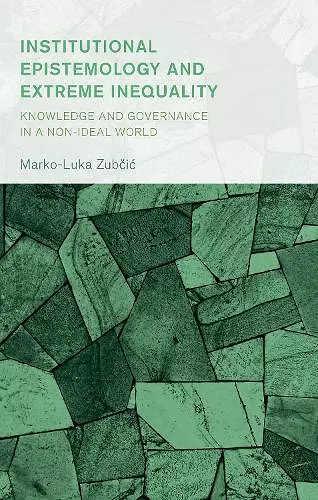Institutional Epistemology and Extreme Inequality
Knowledge and Governance in a Non-ideal World
Format:Hardback
Publisher:Lexington Books
Published:16th Dec '24
Currently unavailable, and unfortunately no date known when it will be back

Institutional Epistemology and Extreme Inequality: Knowledge and Governance in a Non-ideal World provides an account of the fundamental design of an institutional system that can reliably solve problems, learn, and attain knowledge. Reconciling non-ideal system-oriented epistemic democracy and liberalism, Marko-Luka Zubčić develops a unified theory of institutional epistemology. From Deweyan experimentalism and Hayekian epistemic institutionalism to open democracy and pluralist liberalism of New Diversity Theory, Zubčić integrates insights from pragmatism, studies of division of cognitive labor and collective search under complexity, governance studies, and critical social epistemology.
Institutional Epistemology and Extreme Inequality also provides a new, decisive epistemological argument that protection against extreme economic inequalities is a condition of epistemic reliability of an institutional system. Thus, Zubčić shows that—along with constitutional liberties, self-governance, open markets, and polycentricity—freedom from poverty and limits on private wealth are the institutional devices we collectively and individually need to reliably solve difficult problems and attain knowledge.
"For those unfamiliar with this fascinating domain, Institutional Epistemology and Extreme Inequality: Knowledge and Governance in a Non-ideal World can serve as an excellent introduction to the field of institutional epistemology. Even more impressively, Marko-Luka Zubčić brings to the fore, not one, but two cutting-edge contributions, both advancing the research frontier. First, suggesting an original, unifying framework that brings together the distinctive schools of thought that have shaped the field so far. Second, Institutional Epistemology and Extreme Inequality identifies and analyzes economic inequality: an important but previously neglected factor determining the epistemic performance of institutional systems or regimes. In brief, an impressive and notable effort to advance the analytical and normative relevance of a research program exploring innovatively the interface between institutional structures, epistemic processes, and political order."
-- Paul Dragos Aligica, George Mason University“Zubčić offers a critical contribution to the burgeoning literature on institutional and political epistemology. Drawing on democratic and liberal traditions, he develops a persuasive case for why protections against economic inequality are of central importance to the epistemic performance of social institutions. In a moment of political dysfunction and extreme inequalities, this argument could not be timelier.”
-- Jonathan Benson, The University of Manchester“In this lucid essay, Marko-Luka Zubcic provides a highly original synthesis of epistemic democracy and epistemic liberalism. He joins the growing chorus of theorists who use epistemic approaches against socio-economic inequality, providing a rigorous argument for why socio-economic inequality leads to the epistemic corruption of democracy.”
-- Lisa Herzog, professor of political philosophy, University of GroniISBN: 9781666943467
Dimensions: 229mm x 152mm x 21mm
Weight: 490g
222 pages